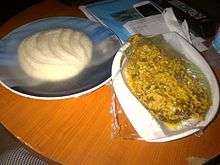Egusi

Egusi seeds are fat- and protein-rich seeds of certain cucurbitaceous (squash, melon, gourd) plants. Authorities disagree whether the word is used more properly for the seeds of the colocynth, those of a particular large-seeded variety of the watermelon, or generically for those of any cucurbitaceous plant.[1] The characteristics and uses of all these seeds are broadly similar.
Etymology
Its name derives from the Igbo and Yoruba language meaning melon.
Usage
Egusi soup is a kind of soup thickened with the ground seeds and popular in West Africa, with considerable local variation.[2] Besides the seeds, water, and oil, egusi soup typically contains leaf vegetables, other vegetables, seasonings, and meat. Typical leaf vegetables for egusi soup include bitterleaf, celosia and spinach. Typical other vegetables include tomatoes and okra. Typical seasonings include chili peppers, onions, and locust beans. Typical meats include beef, goat, fish, shrimp, or crayfish.
In Nigeria, egusi is very popular among the Igbo people of southeastern Nigeria, the Ibibio people and the Efik people (Calabar people) of Southern Nigeria, the Hausa of northern Nigeria and the Yoruba people, Edo people, Esan people, and Etsako people of the southwest of Nigeria. Yoruba people in general and quite notably the people of Ọṣun State – especially the Ijesha people – eat ‘Iyan and Egusi’, a pounded yam and egusi soup.
In the late 1980s, the Canadian government funded a project intended to develop a machine to help Cameroonians shell egusi seeds.[3] A machine has been developed in Nigeria to shell egusi.[4]
See also
References
- ↑ Lost Crops of Africa:: Volume II: Vegetables. National Academies Press. 2006. p. 158.
- ↑ Badiru, I., & Badiru, D. (2013). Isi Cookbook: Collection of Easy Nigerian Recipes. Bloomington: iUniverse. p. 36.
- ↑ "Projects in Cameroon".
- ↑ Shittu, S.K., & Ndrika, V.I.O. (2012). "Development and performance tests of a melon (egusi) seed shelling machine". Agricultural Engineering International: CIGR Journal.